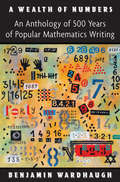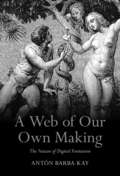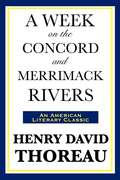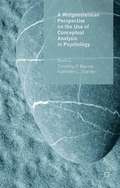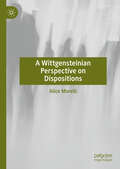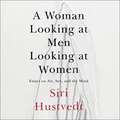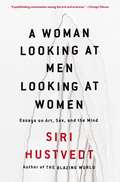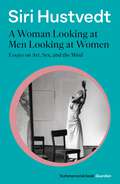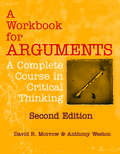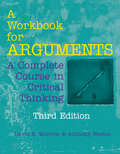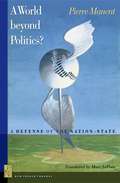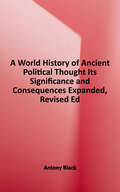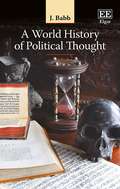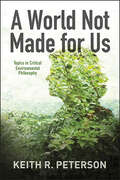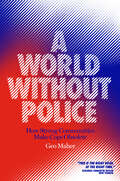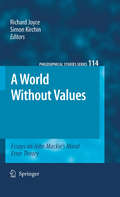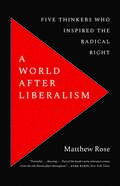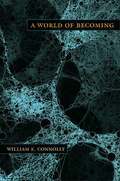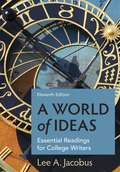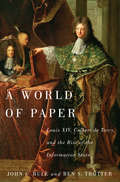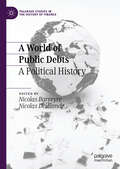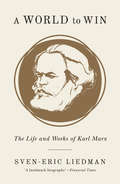- Table View
- List View
A Weak Messianic Power: Figures of a Time to Come in Benjamin, Derrida, and Celan
by Michael G. LevineIn his famous theses on the philosophy of history, Benjamin writes: “We have been endowed with a weak messianic power to which the past has a claim.” This claim addresses us not just from the past but from what will have belonged to it only as a missed possibility and unrealized potential. For Benajmin, as for Celan and Derrida, what has never been actualized remains with us, not as a lingering echo but as a secretly insistent appeal. Because such appeals do not pass through normal channels of communication, they require a special attunement, perhaps even a mode of unconscious receptivity. Levine examines the ways in which this attunement is cultivated in Benjamin’s philosophical, autobiographical, and photohistorical writings; Celan’s poetry and poetological addresses; and Derrida’s writings on Celan.
A Wealth of Numbers
by Benjamin WardhaughDespite what we may sometimes imagine, popular mathematics writing didn't begin with Martin Gardner. In fact, it has a rich tradition stretching back hundreds of years. This entertaining and enlightening anthology--the first of its kind--gathers nearly one hundred fascinating selections from the past 500 years of popular math writing, bringing to life a little-known side of math history. Ranging from the late fifteenth to the late twentieth century, and drawing from books, newspapers, magazines, and websites, A Wealth of Numbers includes recreational, classroom, and work mathematics; mathematical histories and biographies; accounts of higher mathematics; explanations of mathematical instruments; discussions of how math should be taught and learned; reflections on the place of math in the world; and math in fiction and humor. Featuring many tricks, games, problems, and puzzles, as well as much history and trivia, the selections include a sixteenth-century guide to making a horizontal sundial; "Newton for the Ladies" (1739); Leonhard Euler on the idea of velocity (1760); "Mathematical Toys" (1785); a poetic version of the rule of three (1792); "Lotteries and Mountebanks" (1801); Lewis Carroll on the game of logic (1887); "Maps and Mazes" (1892); "Einstein's Real Achievement" (1921); "Riddles in Mathematics" (1945); "New Math for Parents" (1966); and "PC Astronomy" (1997). Organized by thematic chapters, each selection is placed in context by a brief introduction. A unique window into the hidden history of popular mathematics, A Wealth of Numbers will provide many hours of fun and learning to anyone who loves popular mathematics and science.
A Web of Our Own Making: The Nature of Digital Formation
by Antón Barba-KayThere no longer seems any point to criticizing the internet. We indulge in the latest doom-mongering about the evils of social media-on social media. We scroll through routine complaints about the deterioration of our attention spans. We resign ourselves to hating the internet even as we spend much of our waking lives with it. Yet our unthinking surrender to its effects-to the ways it recasts our aims and desires-is itself digital technology's most powerful achievement. A Web of Our Own Making examines how online practices are reshaping our lives outside our notice. Barba-Kay argues that digital technology is a 'natural technology'-a technology so intuitive as to conceal the extent to which it transforms our attention. He shows how and why this technology is reconfiguring knowledge, culture, politics, aesthetics, and theology. The digital revolution is primarily taking place not in Silicon Valley but within each of us.
A Week at the Airport
by Alain De BottonGiven unprecedented access to one of the world’s busiest airports as a “writer-in-residence,” Alain de Botton found it to be a showcase for many of the major crosscurrents of the modern world—from our faith in technology to our destruction of nature, from our global interconnectedness to our romanticizing of the exotic. He met travelers from all over and spoke with everyone from baggage handlers to pilots to the airport chaplain. Weaving together these conversations and his own observations—of everything from the poetry of room service menus to the eerie silence in the middle of the runway at midnight—de Botton has produced an extraordinary meditation on a place that most of us never slow down enough to see clearly. Lavishly illustrated in color by renowned photographer Richard Baker, A Week at the Airport reveals the airport in all its turbulence and soullessness and—yes—even beauty.
A Week on the Concord and Merrimack Rivers
by Henry David ThoreauA Week on the Concord and Merrimack Rivers is both a remembrance of an intensely spiritual moment in Henry David Thoreau's life and a memoriam to his older brother who accompanied him on the trip shortly before his death. Full of fascinating literary musings and philosophical speculations, this book is a true precursor to Walden.
A Wittgensteinian Perspective On The Use Of Conceptual Analysis In Psychology
by Kathleen L. Slaney Timothy P. RacineThis edited volume includes contributions from internationally renowned experts in the philosophy of Ludwig Wittgenstein. It applies his later philosophy to concrete issues pertaining to the integrity of scientific claims in a broad spectrum of research domains within contemporary psychology.
A Wittgensteinian Perspective on Dispositions
by Alice MorelliThis book investigates dispositions in grammatical-normative terms through a contrast between a naturalized paradigm and a Wittgenstein-inspired perspective. The book presents a conceptual analysis of the notion of disposition informed by Wittgenstein's and Ryle's philosophies to defend a normative notion of disposition. The book opens with a presentation of the current naturalized paradigm on dispositions, focusing on its main presuppositions and limits. It then turns to the discussion of a Wittgensteinian-inspired dispositionalism of knowing and understanding, before filling the exegetical gap about Wittgenstein's own use of the notion of disposition. The author critically engages with the current paradigm using Ryle's notion of category mistake, before concluding with a presentation of some philosophical views where a notion of normative disposition is employed. This book is essential reading for anyone searching for a new perspective on dispositions and will broaden the appeal of the Wittgensteinian tradition within contemporary analytic philosophy and, potentially, psychology as well.
A Woman Looking at Men Looking at Women: Essays on Art, Sex, and the Mind
by Siri HustvedtA trail-blazing and inspiring collection of essays on art, feminism, neuroscience and psychology featuring The Delusions of Certainty, winner of the European Essay Prize 2019.As well as being a prize-winning, bestselling novelist, Siri Hustvedt is widely regarded as a leading thinker in the fields of neurology, feminism, art criticism and philosophy. She believes passionately that art and science are too often kept separate and that conversations across disciplines are vital to increasing our knowledge of the human mind and body, how they connect and how we think, feel and see. The essays in this volume - all written between 2011 and 2015 - are in three parts. A Woman Looking at Men Looking at Women brings together penetrating pieces on particular artists and writers such as Picasso, Kiefer and Susan Sontag as well as essays investigating the biases that affect how we judge art, literature, and the world in general. The Delusions of Certainty is an essay about the mind/body problem, showing how this age-old philosophical puzzle has shaped contemporary debates on many subjects and how every discipline is coloured by what lies beyond argument-desire, belief, and the imagination. The essays in the final section, What Are We? Lectures on the Human Condition, tackle such elusive neurological disorders as synesthesia and hysteria. Drawing on research in sociology, neurobiology, history, genetics, statistics, psychology and psychiatry, this section also contains a profound consideration of suicide and a towering reconsideration of Kierkegaard. Together they form an extremely stimulating, thoughtful, wide-ranging exploration of some of the fundamental questions about human beings and the human condition, delivered with Siri Hustvedt's customary lucidity, vivacity and infectiously questioning intelligence.
A Woman Looking at Men Looking at Women: Essays on Art, Sex, and the Mind
by Siri HustvedtA compelling and radical collection of essays on art, feminism, neuroscience, psychology, and philosophy from prize-winning novelist Siri Hustvedt, the acclaimed author of The Blazing World and What I Loved.Siri Hustvedt has always been fascinated by biology and how human perception works. She is a lover of art, the humanities, and the sciences. She is a novelist and a feminist. Her lively, lucid essays in A Woman Looking at Men Looking at Women begin to make some sense of those plural perspectives. Divided into three parts, the first section, "A Woman Looking at Men Looking at Women," investigates the perceptual and gender biases that affect how we judge art, literature, and the world in general. Among the legendary figures considered are Picasso, De Kooning, Jeff Koons, Louise Bourgeois, Anselm Kiefer, Susan Sontag, Robert Mapplethorpe, the Guerrilla Girls, and Karl Ove Knausgaard. The second part, "The Delusions of Certainty," is about the age-old mind/body problem that has haunted Western philosophy since the Greeks. Hustvedt explains the relationship between the mental and the physical realms, showing what lies beyond the argument--desire, belief, and the imagination. The final section, "What Are We? Lectures on the Human Condition," discusses neurological disorders and the mysteries of hysteria. Drawing on research in sociology, neurobiology, history, genetics, statistics, psychology, and psychiatry, this section also contains a profound and powerful consideration of suicide. There has been much talk about building a beautiful bridge across the chasm that separates the sciences and the humanities. At the moment, we have only a wobbly walkway, but Hustvedt is encouraged by the travelers making their way across it in both directions. A Woman Looking at Men Looking at Women is an insightful account of the journeys back and forth.
A Woman Looking at Men Looking at Women: Essays on Art, Sex, and the Mind
by Siri HustvedtA trail-blazing and inspiring collection of essays on art, feminism, neuroscience and psychology featuring The Delusions of Certainty, winner of the European Essay Prize 2019.As well as being a prize-winning, bestselling novelist, Siri Hustvedt is widely regarded as a leading thinker in the fields of neurology, feminism, art criticism and philosophy. She believes passionately that art and science are too often kept separate and that conversations across disciplines are vital to increasing our knowledge of the human mind and body, how they connect and how we think, feel and see. The essays in this volume - all written between 2011 and 2015 - are in three parts. A Woman Looking at Men Looking at Women brings together penetrating pieces on particular artists and writers such as Picasso, Kiefer and Susan Sontag as well as essays investigating the biases that affect how we judge art, literature, and the world in general. The Delusions of Certainty is an essay about the mind/body problem, showing how this age-old philosophical puzzle has shaped contemporary debates on many subjects and how every discipline is coloured by what lies beyond argument-desire, belief, and the imagination. The essays in the final section, What Are We? Lectures on the Human Condition, tackle such elusive neurological disorders as synesthesia and hysteria. Drawing on research in sociology, neurobiology, history, genetics, statistics, psychology and psychiatry, this section also contains a profound consideration of suicide and a towering reconsideration of Kierkegaard. Together they form an extremely stimulating, thoughtful, wide-ranging exploration of some of the fundamental questions about human beings and the human condition, delivered with Siri Hustvedt's customary lucidity, vivacity and infectiously questioning intelligence.
A Workbook for Arguments, Second Edition: A Complete Course in Critical Thinking
by Anthony Weston David R. MorrowA Workbook for Arguments builds on Anthony Weston’s A Rulebook for Arguments to provide a complete textbook for a course in critical thinking or informal logic. The second edition adds:Updated and improved homework exercises—nearly one third are new—to ensure that the examples continue to resonate with students.Increased coverage of scientific reasoning, demonstrating how scientific reasoning dovetails with critical thinking more generallyTwo new activities in which students analyze arguments in their original form, as provided in brief selections from the original texts.This edition continues to includeThe entire text of Rulebook, supplemented with extensive explanations and exercises.Homework exercises adapted from a wide range of arguments in a wide variety of sources.Practical advice to help students succeed.Model answers to odd-numbered problems, including commentaries on the strengths and weaknesses of selected sample answers and further discussion of some of the substantive intellectual, philosophical, or ethical issues they raise.Detailed instructions for in-class activities and take-home assignments.An appendix on mapping arguments, giving students a solid introduction to this vital skill in constructing complex and multi-step arguments and evaluating them.
A Workbook for Arguments: A Complete Course in Critical Thinking
by Anthony Weston David R. MorrowDavid Morrow and Anthony Weston build on Weston's acclaimed A Rulebook for Arguments to offer a complete textbook for a course in critical thinking or informal logic. Features of the book include: Homework exercises adapted from a wide range of actual arguments from newspapers, philosophical texts, literature, movies, YouTube videos, and other sources.Practical advice to help students succeed when applying the Rulebook's rules.Suggestions for further practice that outline activities students can do by themselves or with classmates to improve their critical thinking skills.Detailed instructions for in-class activities and take-home assignments designed to engage students in critical thinking.An appendix on mapping arguments, a topic not included in the Rulebook, that introduces students to this vital skill in evaluating or constructing complex and multi-step arguments.Model responses to odd-numbered exercises, including commentaries on the strengths and weaknesses of selected model responses as well as further discussion of some of the substantive intellectual, philosophical, and ethical issues raised by the exercises. The third edition of Workbook contains the entire text of the recent fifth edition of the Rulebook, supplementing this core text with extensive further explanations and exercises.Updated and improved homework exercises ensure that the examples continue to resonate with today&’s students. Roughly one-third of the exercises have been replaced with updated or improved examples.A new chapter on engaging constructively in public debates—including five new sets of exercises—trains students to engage respectfully and constructively on controversial topics, an increasingly important skill in our hyper-partisan age. Three new critical thinking activities offer further opportunities to practice constructive dialogue.
A World Beyond Politics?: A Defense Of The Nation-state
by Pierre Manent Marc A. LePainWe live in the grip of a great illusion about politics, Pierre Manent argues in A World beyond Politics? It's the illusion that we would be better off without politics--at least national politics, and perhaps all politics. It is a fantasy that if democratic values could somehow detach themselves from their traditional national context, we could enter a world of pure democracy, where human society would be ruled solely according to law and morality. Borders would dissolve in unconditional internationalism and nations would collapse into supranational organizations such as the European Union. Free of the limits and sins of politics, we could finally attain the true life.
A World History of Ancient Political Thought: Its Significance and Consequences
by Antony BlackThis book examines the political thought of China, Greece, Israel, Rome, India, Iran, Egypt, Mesopotamia, and also early Christianity, from prehistory to c. 200 CE. Each of these had its priorities, based on a religious and philosophical perspective. This led to different ideas about who should govern, how to govern, and what government was for. In most cultures, sacred monarchy was the norm, but this ranged from absolute to conditional authority. 'The people' were recipients of royal (and divine) beneficence. Justice, the rule of law, and meritocracy were generally regarded as fundamental. In Greece and Rome, democracy and liberty were born, while in Israel the polity was based on covenant and the law. Confucius taught humaneness, Mozi and Christianity taught universal love; Kautilya and the Chinese 'Legalists' believed in realpolitik and an authoritarian state. <p><p>The conflict between might and right was resolved in many different ways. Chinese, Greek and Indian thinkers reflected on the origin and purposes of the state. Status and class were embedded in Indian and Chinese thought, the nation in Israelite thought. On the other hand, the Stoics and Cicero saw humanity as a single unit. Political philosophy, using logic, evidence and dialectic, was invented in China and Greece, statecraft in China and India, political science in Greece. Plato and Aristotle, followed by Polybius and Cicero, started 'western' political philosophy. This book covers political philosophy, religious ideology, constitutional theory, social ethics, official and popular political culture.
A World History of Political Thought
by J. BabbIts an outstanding and innovative work with profound significance for the study of the history of political thought, providing a wide-ranging, detailed and global overview of political thought from 600 BC to the 21st century. Treating both western and non-western systems of political thought as equal and placing them as they should be; side by side.
A World Not Made for Us: Topics in Critical Environmental Philosophy (SUNY series in Environmental Philosophy and Ethics)
by Keith R. PetersonIn A World Not Made for Us, Keith R. Peterson provides a broad reassessment of the field of environmental philosophy, taking a fresh and critical look at three classical problems of environmentalism: the intrinsic value of nature, the need for an ecological worldview, and a new conception of the place of humankind in nature. He makes the case that a genuinely critical environmental philosophy must adopt an ecological materialist conception of the human, a pluralistic value theory that emphasizes the need for value prioritization, and a stratified categorial ontology that affirms the basic principle of human asymmetrical dependence on more-than-human nature. Integrating environmental ethics with the latest work in political ecology, Peterson argues it is important to understand that the world is not made for us, and that coming to terms with this fact is a condition for survival in future human and more-than-human communities of liberation and solidarity.
A World Without Police: How Strong Communities Make Cops Obsolete
by Geo MaherIf police are the problem, what’s the solution? <p><p> Tens of millions of people poured onto the streets for Black Lives Matter, bringing with them a wholly new idea of public safety, common security, and the delivery of justice, communicating that vision in the fiery vernacular of riot, rebellion, and protest. A World Without Police transcribes these new ideas—written in slogans and chants, over occupied bridges and hastily assembled barricades—into a compelling, must-read manifesto for police abolition. <p><p> Compellingly argued and lyrically charged, A World Without Police offers concrete strategies for confronting and breaking police power, as a first step toward building community alternatives that make the police obsolete. Surveying the post-protest landscape in Minneapolis, Philadelphia, Chicago, and Oakland, as well as the people who have experimented with policing alternatives at a mass scale in Latin America, Maher details the institutions we can count on to deliver security without the disorganizing interventions of cops: neighborhood response networks, community-based restorative justice practices, democratically organized self-defense projects, and well-resourced social services. <p><p> A World Without Police argues that abolition is not a distant dream or an unreachable horizon but an attainable reality. In communities around the world, we are beginning to glimpse a real, lasting justice in which we keep us safe.
A World Without Values: Essays on John Mackie's Moral Error Theory (Philosophical Studies Series #114)
by Richard Joyce Simon KirchinWhat kind of properties are moral qualities, such as rightness, badness, etc? Some ethicists doubt that there are any such properties; they maintain that thinking that something is morally wrong (for example) is comparable to thinking that something is a unicorn or a ghost. These "moral error theorists" argue that the world simply does not contain the kind of properties or objects necessary to render our moral judgments true. This radical form of moral skepticism was championed by the philosopher John Mackie (1917-1981). This anthology is a collection of philosophical essays critically examining Mackie's view.
A World after Liberalism: Philosophers of the Radical Right
by Matthew RoseA bracing account of liberalism&’s most radical critics, introducing one of the most controversial movements of the twentieth century In this eye-opening book, Matthew Rose introduces us to one of the most controversial intellectual movements of the twentieth century, the &“radical right,&” and discusses its adherents&’ different attempts to imagine political societies after the death or decline of liberalism. Questioning democracy&’s most basic norms and practices, these critics rejected ideas about human equality, minority rights, religious toleration, and cultural pluralism not out of implicit biases, but out of explicit principle. They disagree profoundly on race, religion, economics, and political strategy, but they all agree that a postliberal political life will soon be possible. Focusing on the work of Oswald Spengler, Julius Evola, Francis Parker Yockey, Alain de Benoist, and Samuel Francis, Rose shows how such thinkers are animated by religious aspirations and anxieties that are ultimately in tension with Christian teachings and the secular values those teachings birthed in modernity.
A World of Becoming
by William E. ConnollyIn A World of Becoming William E. Connolly outlines a political philosophy suited to a world whose powers of creative evolution include and exceed the human estate. This is a world composed of multiple interacting systems, including those of climate change, biological evolution, economic practices, and geological formations. Such open systems, set on different temporal registers of stability and instability, periodically resonate together to produce profound, unpredictable changes. To engage such a world reflectively is to feel pressure to alter established practices of politics, ethics, and spirituality. In pursuing such a course, Connolly draws inspiration from philosophers such as Maurice Merleau-Ponty, Alfred North Whitehead, and Gilles Deleuze, as well as the complexity theorist of biology Stuart Kauffman and the theologian Catherine Keller. Attunement to a world of becoming, Connolly argues, may help us address dangerous resonances between global finance capital, cross-regional religious resentments, neoconservative ideology, and the 24-hour mass media. Coming to terms with subliminal changes in the contemporary experience of time that challenge traditional images can help us grasp how these movements have arisen and perhaps even inspire creative counter-movements. The book closes with the chapter "The Theorist and the Seer," in which Connolly draws insights from early Greek ideas of the Seer and a Jerry Lewis film, The Nutty Professor, to inform the theory enterprise today.
A World of Ideas: Essential Readings for College Writers
by Lee A. JacobusThe book engages students with the big ideas that have shaped society and are reshaping it today. Readings by essential authors -help students trace the origins of central cultural concepts and respond to them. A World of Ideas asks such crucial questions as, What defines good government? What forces shape our society? What does it mean to be educated? The text helps students respond to these questions by providing the guidance they need to understand, analyze, and write. Substantial, supportive apparatus helps students focus on both the content of the readings as well as the rhetorical moves that writers use to achieve their purposes, providing instruction and models as students join in the important conversations continuing today. New chapters on Education and Gender, and new readings throughout, speak to today's urgent concerns. Improved writing instruction includes more scaffolding and examples that provide greater support for students.
A World of Paper: Louis XIV, Colbert de Torcy, and the Rise of the Information State
by John C. Rule Ben S. TrotterHistorians and social scientists have long identified bureaucracy as the modern state's foundation and the reign of France's Louis XIV as a model for its development. A World of Paper offers a fresh interpretation of bureaucracy through a close examination of the department of the Sun King's last foreign secretary, Jean-Baptiste Colbert de Torcy. Torcy, who served as foreign secretary from 1696-1715, is widely regarded as one of the most brilliant foreign ministers of the ancien regime. Building on the work of his predecessors, he fashioned a skilled team of collaborators as he managed the complex issues of war and peace during the turbulent final decades of Louis XIV's reign. John Rule and Ben Trotter examine Torcy's department to depict administrative structures as they emerged through the circulating stream of paper that connected his office with provincial administrators and diplomats abroad. They explore the collection and centralization of information during Torcy's tenure through the creation of a modern state archive, discreet intelligence gathering, and the surveillance and management of the French mails. They also study the postal carriers, couriers, household officers of the royal court, genealogists hired for research, and an informal "brain trust" of experts, and advisors who carried vital information in and out of the department every day. A remarkable reconstruction of the department of Jean-Baptiste Colbert de Torcy, A World of Paper demystifies bureaucracy and explores the ways in which the modern information state developed from his labours.
A World of Public Debts: A Political History (Palgrave Studies in the History of Finance)
by Nicolas Barreyre Nicolas DelalandeThis book analyzes public debt from a political, historical, and global perspective. It demonstrates that public debt has been a defining feature in the construction of modern states, a main driver in the history of capitalism, and a potent geopolitical force. From revolutionary crisis to empire and the rise and fall of a post-war world order, the problem of debt has never been the sole purview of closed economic circles. This book offers a key to understanding the centrality of public debt today by revealing that political problems of public debt have and will continue to need a political response. Today’s tendency to consider public debt as a source of fragility or economic inefficiency misses the fact that, since the eighteenth century, public debts and capital markets have on many occasions been used by states to enforce their sovereignty and build their institutions, especially in times of war. It is nonetheless striking to observe that certain solutions that were used in the past to smooth out public debt crises (inflation, default, cancellation, or capital controls) were left out of the political framing of the recent crisis, therefore revealing how the balance of power between bondholders, taxpayers, pensioners, and wage-earners has evolved over the past 40 years. Today, as the Covid-19 pandemic opens up a dramatic new crisis, reconnecting the history of capitalism and that of democracy seems one of the most urgent intellectual and political tasks of our time. This global political history of public debt is a contribution to this debate and will be of interest to financial, economic, and political historians and researchers. Chapters 13 and 19 are available open access under a Creative Commons Attribution 4.0 International License via link.springer.com.
A World to Win: The Life and Thought of Karl Marx
by Sven-Eric Liedman Jeffrey N. SkinnerEpic new biography of Karl Marx for the 200th anniversary of his birthIn this essential new biography—the first to give equal weight to both the work and life of Karl Marx—Sven-Eric Liedman expertly navigates the imposing, complex personality of his subject through the turbulent passages of global history. A World to Win follows Marx through childhood and student days, a difficult and sometimes tragic family life, his far-sighted journalism, and his enduring friendship and intellectual partnership with Friedrich Engels.Building on the work of previous biographers, Liedman employs a commanding knowledge of the nineteenth century to create a definitive portrait of Marx and his vast contribution to the way the world understands itself. He shines a light on Marx’s influences, explains his political and intellectual interventions, and builds on the legacy of his thought. Liedman shows how Marx’s masterpiece, Capital, illuminates the essential logic of a system that drives dizzying wealth, grinding poverty, and awesome technological innovation to this day.Compulsively readable and meticulously researched, A World to Win demonstrates that, two centuries after Marx’s birth, his work remains the bedrock for any true understanding of our political and economic condition.
A World without Why
by Raymond GeussWhy the human and natural world is not as intelligible to us as we think it isWishful thinking is a deeply ingrained human trait that has had a long-term distorting effect on ethical thinking. Many influential ethical views depend on the optimistic assumption that, despite appearances to the contrary, the human and natural world in which we live could, eventually, be made to make sense to us. In A World without Why, Raymond Geuss challenges this assumption.The essays in this collection—several of which are published here for the first time—explore the genesis and historical development of this optimistic configuration in ethical thought and the ways in which it has shown itself to be unfounded and misguided. Discussions of Greco-Roman antiquity and of the philosophies of Socrates, Plato, Hegel, Marx, Nietzsche, and Adorno play a central role in many of these essays. Geuss also ranges over such topics as the concepts of intelligibility, authority, democracy, and criticism; the role of lying in politics; architecture; the place of theology in ethics; tragedy and comedy; and the struggle between realism and our search for meaning.Characterized by Geuss's wide-ranging interests in literature, philosophy, and history, and by his political commitment and trenchant style, A World without Why raises fundamental questions about the viability not just of specific ethical concepts and theses, but of our most basic assumptions about what ethics could and must be.

